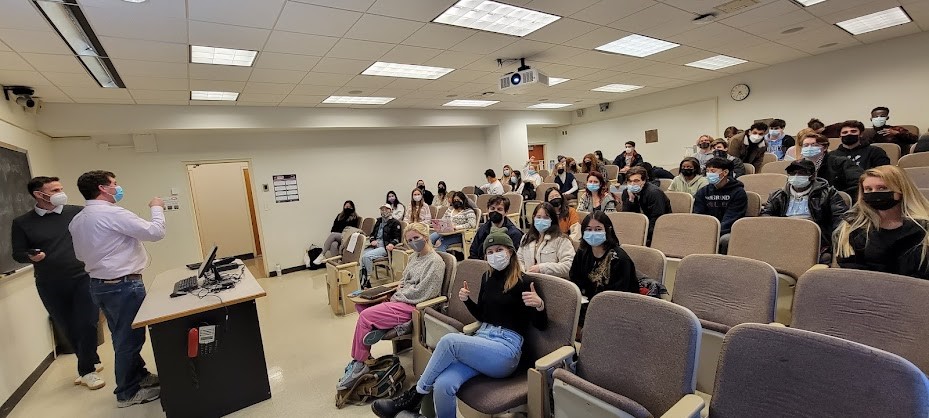

UNC student group works with University professors to launch one of the world’s first cellular agriculture courses.

The Chapel Hill Alt Protein Project, the Good Food Institute and UNC-Chapel Hill have collaborated to create the first cellular agriculture course in North Carolina, which launched in January of 2022. The biology course is entitled The Cellular Agriculture Revolution and is open to all students at Carolina. There are no prerequisites, and it fulfills requirements for the Biology and Environmental Studies majors.
Cellular agriculture is a subset of the alternative protein field, which includes plant-based, fermentation and cellular agriculture-derived alternatives to meat, eggs and dairy. Cellular agriculture takes nature’s most elemental building blocks — cells — and cultivates them to become true animal products without the need to raise and slaughter animals. Cellular agriculture has a significantly smaller impact on the environment than conventional meat. In fact, producing meat through cultivation results in up to 92 percent less global warming when used with renewable energies.
The Chapel Hill Alt Protein Project is a student organization at UNC-Chapel Hill that is supported by the Good Food Institute and is dedicated to turning universities in the Research Triangle area of North Carolina into engines for alternative protein education, research and innovation. Alt Protein Project students have been working with three Carolina professors over the past year to develop and launch the course. The course was full after the first day of registration, demonstrating that demand for alt protein education at the university is high.
UNC-Chapel Hill is a global trailblazer in alternative protein education. The course is one of the first alternative protein courses launched in the world, following Tufts University, Singapore University and Hebrew University.
Alternative protein courses give students the skills to participate in this exciting fields. By offering the Cellular Agriculture Revolution course, UNC-Chapel Hill is building a talent pipeline for alternative protein companies based in North Carolina and around the globe. Professors and weekly guest speakers from the industry will introduce students to the technical challenges in this quickly growing field and inspire them to discover how their interests and skills align with it.
Sophia Retchin, co-founder of The Chapel Hill Alt Protein Project and co-creator of the course, was frustrated to find that no previous course offered information on alternative protein when she arrive at UNC-Chapel Hill her freshman year. “As an environmental studies major, I was frustrated that none of my courses were talking about alternative protein as a solution to environmental problems, and the topic was almost taboo on campus. I knew I wanted to change this by the time I graduated,” she said. “Incorporating alternative protein education into universities is extremely important, because if our professors are not teaching students about this amazing field, then how are we going to fuel it with amazing talent?”
Dr. Douglas Phantsiel, a biology professor teaching part of the course, said, “This course is an exciting opportunity to participate in the crucial effort toward a more sustainable, healthy and just food system. I am impressed and inspired by the work of the student-run Chapel Hill Alt Protein Project in propelling the course and engaging the community with this promising field of research and development.”
The Research Triangle Area in North Carolina has a growing alternative protein hub, with over 15 companies in the area involved in alternative protein production. There is also public involvement in the field. The state’s Department of Agriculture funded the North Carolina Food Innovation Lab, the only cGMP pilot plant in the United States dedicated to plant-based food development and commercialization.
In order to solve its various challenges and commercialize cellular agriculture technology at scale, the field needs professionals with a wide range of expertise, including chemists, biologists, engineers, policymakers, businesspeople and others. The Cellular Agriculture Revolution course is just the beginning of the University’s alternative protein curriculum, with hopes to one day offer an alternative protein minor. Students are ready to engage in cellular agriculture, and the University is now offering foundational knowledge and training for students to maximize their impact in this revolutionary field.
The Chapel Hill Alt Protein Project is a student organization at UNC-Chapel Hill, and is supported by the Good Food Institute. The group strives to build a healthy, sustainable and just food system by creating a vibrant and robust community for alternative protein research and innovation at the University.